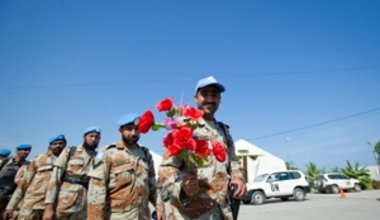Voter registration helps to remind people why electoral participation is important
Dili, 10 June 2010 - The voter registration process in Timor-Leste is drawing to a close and the "Exhibition and Challenge" stage is well underway. During this time people are able to check that their name appears on the electoral register and that all the details are correct.
"I came to see if my name was on the list because I have recently moved to a different Suco", says Joaquim Barros who visited the registration centre in the Liquica sub-district. "Sometimes a person's name isn't there or it is incorrect. It's better to be absolutely sure".
When an individual registers to vote they receive an official identity card. This is a strong incentive to take part in the democratic process.
"Elections are important, but voting doesn't happen every day or even every year. However, an electoral ID card can help improve people's daily lives", that's the view of Leonel da Silva Lopes who at the age of 26 is the young Suco Chief of Luculai, within the Liquica district.
Possessing an ID card is vital for individuals when applying for a job or a bank account, and for registering with a school or health centre.
The organization and supervision of elections in Timor-Leste is the responsibility of the Technical Secretariat for Electoral Administration (STAE) and the National Elections Commission (CNE). The United Nations Electoral Support Team (UNEST) provides support and technical assistance so that the electoral process runs smoothly.
"It's important for the UN to provide long-term assistance in the electoral area to help build up the democratic system in Timor-Leste, and to strengthen the capacity of the national electoral institutions", explains Andres del Castillo from the UN Electoral Support Team.
The process of registration fosters the principle of equality for all citizens and actively promotes the inclusion of eligible voters in elections. Voting gives everyone a chance to participate and to have their say in who represents them in their community and also at a national level.
"I really enjoy casting my vote", says Martina Freitas who was queuing to register in Liquica. "In the Suco elections we get to vote for people who understand the needs of our individual communities and in the national elections we get to choose a leader who will look after the nation and all the people".
Voter turnout in the 2009 Suco elections was 68%. This is high compared to local elections in other countries around the world, where voting is also not compulsory. Providing prospective voters with information is important for encouraging voter turnout.
"In the 2004 Suco elections people didn't know the law. They didn't know who could stand as a candidate and how they could register to vote. The process has improved a lot", emphasizes Suco Chief Lionel da Silva Lopes.
The Exhibition and Challenge process is due to end on Saturday 12th June.
---------------------
Clare Santry
Media and Communications Officer
UNDP Timor-Leste
Office: (+670) 331 2481 x2019
Mobile: (+670) 7245425
Fax: (+670) 331 3534
Email: clare.santry@undp.org
Web: www.tl.undp.org
 UN
UN United Nations Peacekeeping
United Nations Peacekeeping




